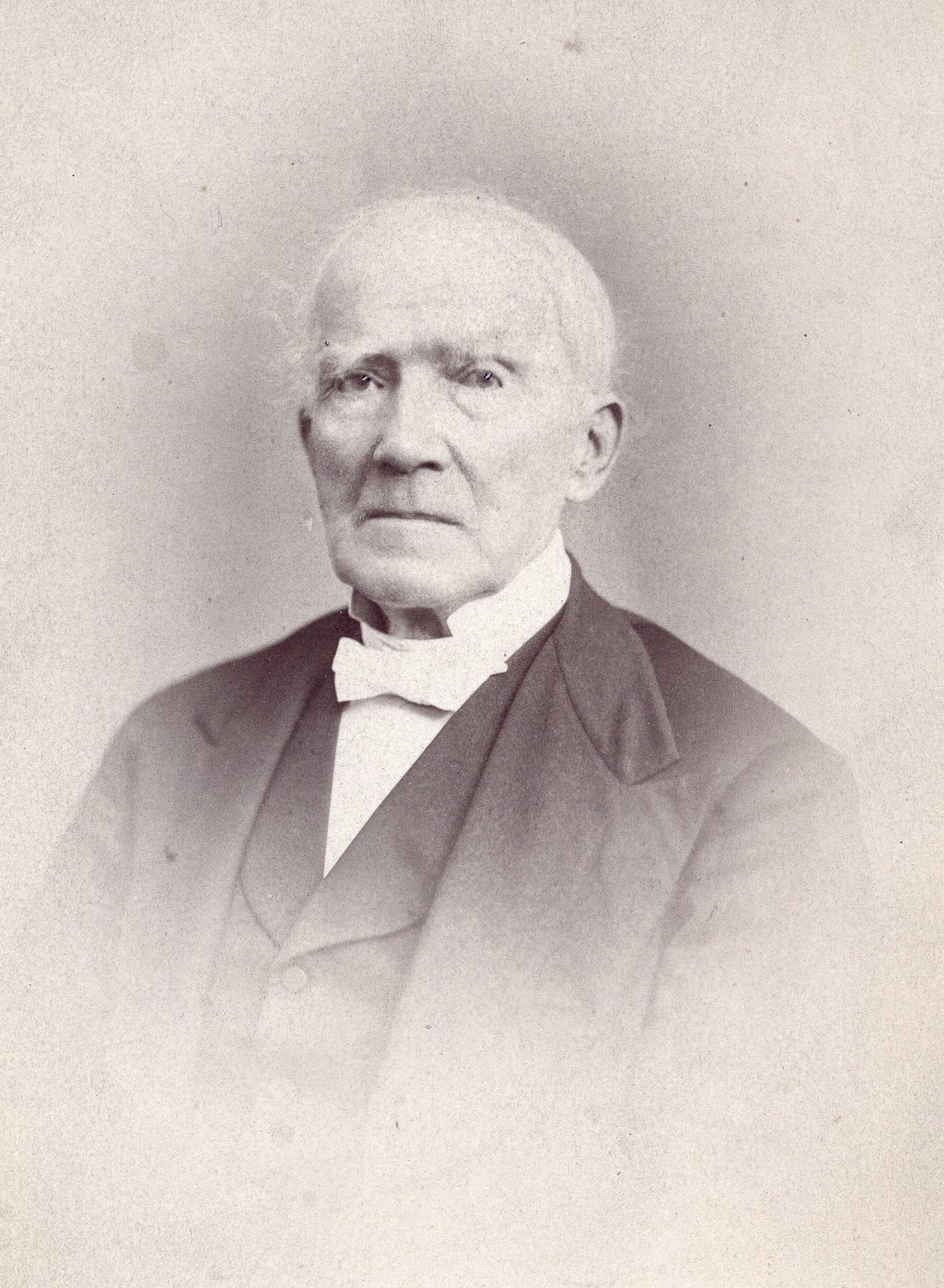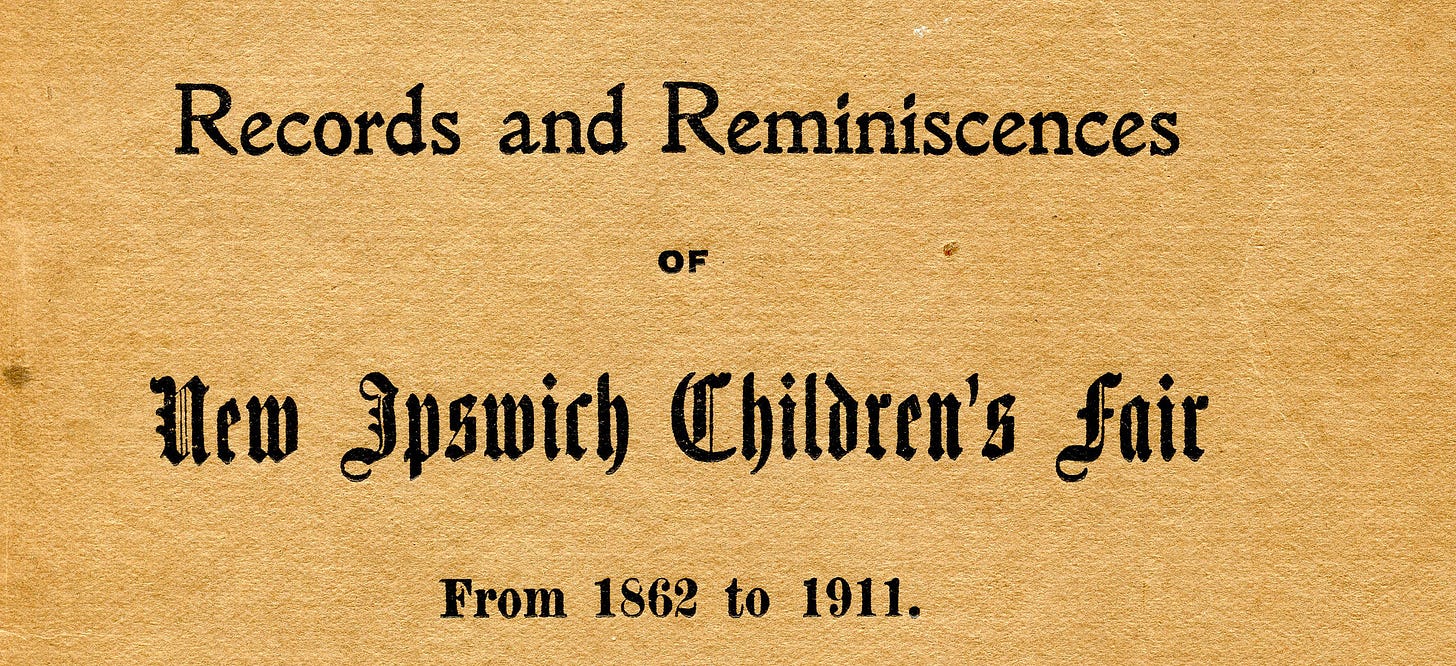Oliver Swain Taylor, a native of New Ipswich, was born on December 17, 1784, and died April 19, 1885, at Auburn, N. Y. He was preceptor of Appleton Academy from 1808 to 1811. The Chandler History of New Ipswich has this statement about Mr. Taylor: "He exercised the duties of the position with much success, and the school reached an unusual degree of prosperity."
On this day - July 24, 1908
James Roger diary entry
24th (Friday)
Warm with showers in morning. David took coop of chickens to Depot in morning and brought Alice’s box. Took the Prestons to Club House in forenoon and brought them back in afternoon. I picked 2 chicks and a can of blueberries.
On this day - July 24, 1897
William Jurian Kaula diary - no entry
Records and Reminiscences of the New Ipswich Children’s Fair from 1862 to 1911
By Mrs. C. H. Obear - Pages 33 - 38 (Continued)
Distant churches and congregations would send to us for information about the methods of our fair and how it had been kept up with unabated interest for so many years; these confirmed our faith in the wisdom and foresight of the founders of the Children's Fair of benevolence. If, as we did, we learned that these attempts to institute such a permanent harvest offering failed to make it lasting, it was because there was effort made to retain a part of what they raised for some home use, or to draw from it into some denominational channel or direction less truly democratic; and we resisted deviation. I remember many events seemingly trifling which stirred a ripple in the even course of our yearly returning festival. The letters of acknowledgment from those to whom the money results were sent gave us cheer and stimulated us to hold on our course.
From the New Hampshire Orphans' Home they told us that the sum sent had helped to procure conveyance to take the fatherless, and motherless, and homeless ones to church on the Sabbath; or of the number of warm garments provided for the children coming to Franklin Home, as the winter drew near, and the thinly clad little ones had come in unusual numbers.
From other institutions similar missives. And these gladdened our hearts, and gave the boys and girls keen pleasure and quickened their good resolves.
If there were few changes during the years between 1873 and 1887, here and there reviewing the years, we recall the pleasant tokens coming to us from former co-laborers and. participators in the pleasures of this day, as one expressed it, "of coming together to show our good will to men." Some times inquiries came from distant congregations asking information in regard to the methods of our fair. Sometimes hearty thanks and a recital of the work they had been able to do with the sum we had sent; sometimes gifts to increase our receipts on the birth of a child, to make him a member of the institution his father or mother had loved.
Once our beloved pastor and friend, who was a leader in founding the fair, sent five dollars, asking us to send a barrel of contributions to the sale-tables, for their home use in Auburndale, and we marked each article with the name of the donor, and sent the price for which we bought it, and filled and sent the barrel.
When he acknowledged it, he told us about the opening, saying that no home missionary ever examined the contents of a box or barrel with more interest than his family when they gathered round the barrel; the dainty pieces of needle work wrought by the fingers of some of his young people of his first pastorate-and he named them-the sweet pumpkins of good old Deacon Reuben Taylor; the doll and other playthings for his children from ours with the names attached. The choice apples and pears from Mr. O., the nuts from the Hildreth girls, etc.
Our fair was conducted on a plan that recommended itself to the good sense and confidence of the people, and apparently there was no need of material change from year to year, or new schemes and strenuous exertion to keep it alive. It went on from year to year quietly and smoothly for the first twenty five years, as it has the twenty-five approaching in the coming October, with little change in its management.
The children who had a part in the first years are no longer young. Their children and grand-children gather around them, reminding them of their own childhood. They recall the gatherings in the old church in the beautiful October days when earth, air and sky told of joy, and peace, and plenty.
Fifty years ago, when Sunday worship in the sanctuary was the rule and not the exception, and there was both a forenoon and afternoon "meeting," in the interval between the two, the children on the farms and in the villages (and our town is a town of many villages, or was half a century ago) became acquainted with each other at church. The repressed vivacity and serious bearing demanded in order to "Remember the Sabbath day to keep it holy," according to the rules laid down by their Pilgrim ancestry, made it a keen delight to come to the meeting-house on a week day, with larger liberty to indulge in a more thorough and free expression of themselves as children-glad, happy, merry children.
It was this, with the consciousness of meeting on this one. day of the year, free from the restraint of the Sunday meeting, and getting acquainted with each other as separated school districts; and the pleasure of being on an equality with their fathers and mothers and the rest of the "grown folks."
Should we wonder that the aged people of this century should sometimes sigh for the days when the old code of laws prevailed, viz.: "Children should be seen, not heard" and "Spare the rod and spoil the child?" I have said men and women used to be more apart in social life, and it was certainly true of the old folks and young folks.
Besides these two attractions of this day in harvest time there was the satisfaction that always accompanies doing good, unselfish deeds. They were having a good time, and at the end of the day there would be means to send to others more destitute of resources for happiness than themselves; and they had their part in earning these means during the year.
These were the reasons, or some of them, that so entrenched their affections, that the fair has not grown monotonous nor tame, even if there has been few changes in its management. I say no change in management. That is, in any important respect. We follow the fashions of the times we live in.
These demand greater variety of refreshments for our tables. Children eat more sweets than were allowed them fifty years ago. We have a table where confectionery is sold. The Plain dinner is no longer "plain" since we indulge so increased appetite for sweet things. People who do not live. on farms do not come to the fair to lay in choice vegetables for winter consumption as they used to do, now that they can order them of their grocer; and consequently there is not so much inducement to raise vegetables to offer where they do not bring the old competition in bidding at auction.
Our children as a whole are less acquainted with the various objects of charity than a former generation who were church goers and often heard the eloquent pleas of "Agents" presenting the claims of different benevolent institutions. But we have gone on amid all the changes of the times with remarkable regularity, and see at the end of the fifty years in the coming October, no material failure or decrease in vigor in the Children's Fair of New Ipswich accompanying its large decrease of population.
It is creditable to the town that its people amid the multiplication of "organizations," still so well sustain this institution planted by a generation who are passed or are passing away.
Not long after the inauguration of the fair, the day was made a more general holiday by closing the academy in time to have the students take their dinner at the church, and having no recitations for the remainder of the day.
The common schools having various lengths of terms, if not having a vacation at the time, closed for the day. The farms out on the hills have in the last twenty-five years passed into the hands of foreigners. Their products do not, of course, as in the old days swell the receipts of our fair for benevolent purposes, but our proceeds have not materially diminished.
This is owing to the fact that in so many of the minds of former residents and old contributors there linger memories, tender and pleasant, of their participation in these annual gatherings, and with increased facilities for traveling and increased indulgence of desire to celebrate the close of their own spring and summer labors on their farms, they take "New Ipswich Children's Fair" as an objective point; and our receipts are increased by the dinner tickets they buy and payment at the door. On account of these same pleasant memories, there comes to us often gifts for our tables, of dainty articles of needlework, or attractive fancy articles; curiosities from distant parts of our country; or checks of small amount, coming from parents on the birth of their children, or grand children, to associate their names with the old harvest feast, so fondly remembered.
In these tenacious clingings of the heart to the vanished. past, there seems to me a promise of the perpetuity of our fair. I pass on to the reminiscences and records of our Quarter Centennial in 1887.
[To Be Continued]





